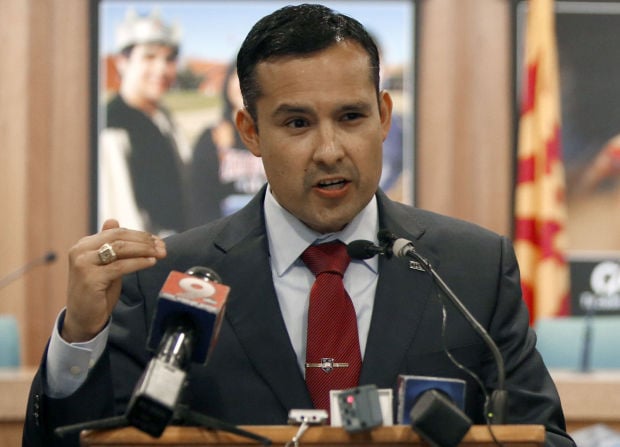Some vacant Tucson schools could be converted into shelters to house unaccompanied migrant children now flooding into the country.
The idea to house the children at the empty campuses while officials work to reunify them with family members came from Adelita Grijalva, president of the Tucson Unified School District Governing Board, and is supported by TUSD Superintendent H.T. Sanchez.
“We’re always open to helping in any way we can,” Sanchez said Thursday. “We would be very agreeable to educating the students and using a facility to house those who have been processed and allowed to stay in the U.S.”
Shelters are in demand as a record number of unaccompanied minors are traveling from Central America seeking a life in the United States. More than 52,000 children have been detained so far this fiscal year.
Where Sanchez said he would draw the line is if the proposal was to convert a closed school into a detention facility.
“Right now, what the folks with the Department of Homeland Security are looking for is detention facilities,” Sanchez said. “If they want to use a site as a detention facility that is secured and locked down with armed agents, that’s another thing, and we don’t want to get into that.”
Grijalva came up with the idea, which she shared with Sanchez, after a visit to a Nogales facility that serves as a processing center for the children. Grijalva then asked her father — U.S. Rep. Raúl Grijalva — to pass the idea along to the Office of Refugee Resettlement. As of Thursday, TUSD had not been contacted by any government official.
The congressman’s office said it has not officially forwarded the proposal yet but intends to.
“It really is tragic,” Adelita Grijalva said. “You walk in, all of the children are sort of in cages, separated by chain-link fences and barbed wire, and then there are stand-alone portapotties in the middle of this converted warehouse being used by hundreds of kids daily.
“We have a lot of vacant property, and if FEMA can convert a warehouse, they can convert a school.”
Grijalva added that it made more sense to house a roomful of 4-year-olds in a kindergarten classroom with a personal restroom, rather than in a warehouse.
“It really was a question of, has anyone explored using the vacant facilities available? In Texas, they have closed some schools as well, so it’s more of an idea to renovate schools where there is a need,” she said.
Fellow TUSD Governing Board member Mark Stegeman doesn’t have an issue with using closed campuses in this manner, but he said there are three factors that would impact his decision: financial — whether the district would receive funding for the shelters; neighborhood input; and whether the move would complement TUSD’s educational mission.
While Stegeman said it is hard to see how providing such a service would meet the third criterion, it would likely need to fit the other two criteria to have his support.
“If the government was going to give us money to do this and the neighborhood was happy with it, then I might say it’s fine,” Stegeman said. “If the government is going to house them anyway, and it’s a question of do they house them at one of our closed schools or somewhere else, I have no problem with them using our site.”
While no specific TUSD schools have been identified for possible conversion, there are eight closed campuses that are not in use. In selecting a site, the district would take into consideration when sites were closed, and the ages and number of children who would need to be served.
Sites that have not yet been repurposed in TUSD are:
- Corbett Elementary School, 5949 E. 29th St.
- Lyons Elementary School, 7555 E. Dogwood St.
- Fort Lowell Elementary School, 5151 E. Pima St.
- Reynolds Elementary School, 7450 E. Stella Road.
- Van Horne Elementary School, 7550 E. Pima St.
- Hohokam Middle School, 7400 S. Settler Ave.
- Carson Middle School, 7777 E. Stella Road.
- Fort Lowell-Townsend K-8, 2120 N. Beverly Ave.
If the plan is to move forward, it would require work from various entities, including the Federal Emergency Management Agency and the Homeland Security Department, along with zoning efforts. Input would be sought from neighborhood associations as well, Sanchez said.
“This is not something that would happen quickly, and it wouldn’t be done hastily without input from the community,” Sanchez said.
Tucson City Councilman Steve Kozachik has offered his services to TUSD in helping to set up neighborhood meetings in Ward 6, saying he is “absolutely, totally open to the conversation.”
“I would want to engage my constituents to find out what their concerns are,” Kozachik said. “They might all say: ‘Hey, great. It’s a humanitarian refugee effort; we’re all for it.’ Then I would embrace that. On the other hand, they might say, ‘We have concerns.’ Then you talk through how you mitigate the concerns.”
Added Grijalva: “Once you go to a facility like that and see how the children are living, you know there has to be a better solution. If there is an opportunity to support these children better by using one or two of our schools, I would ask that it be considered.”





